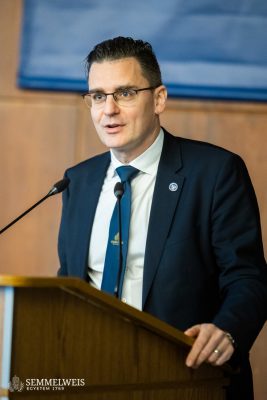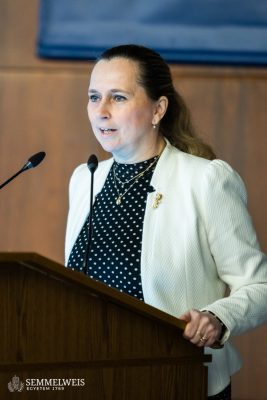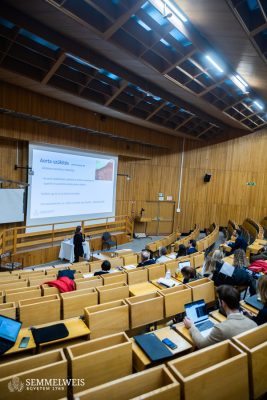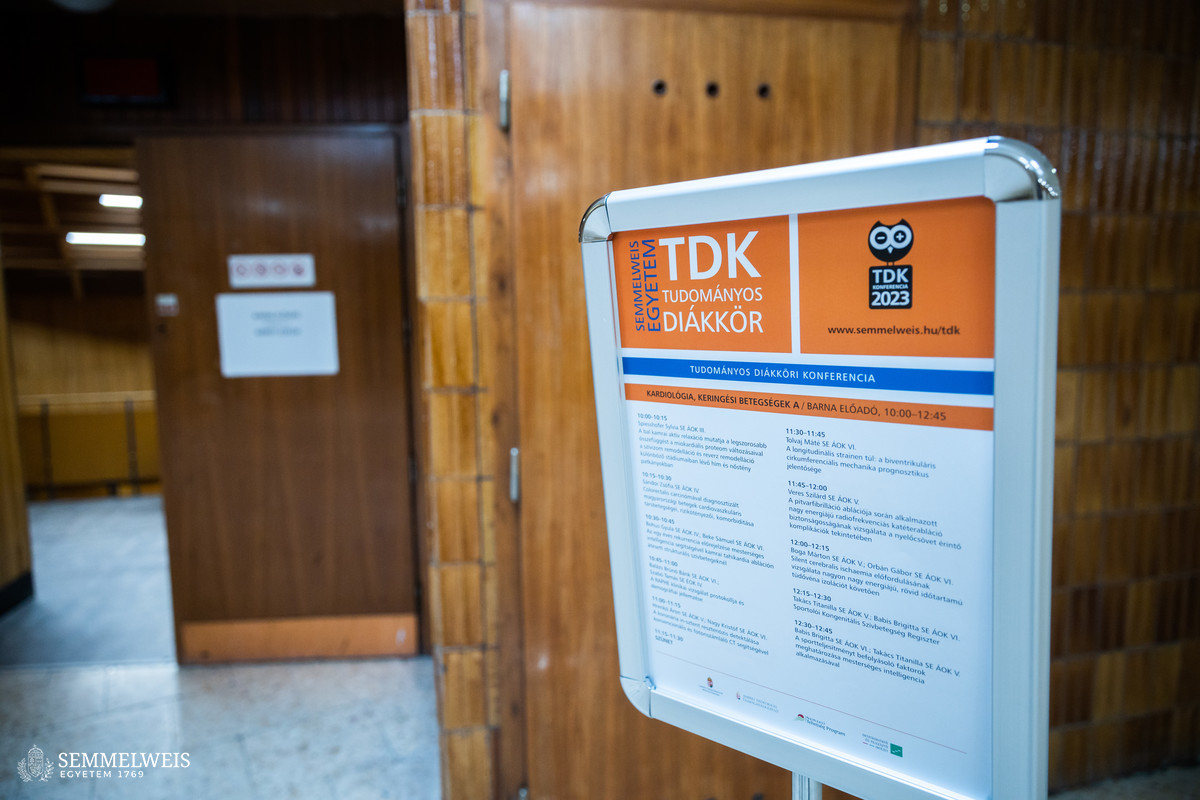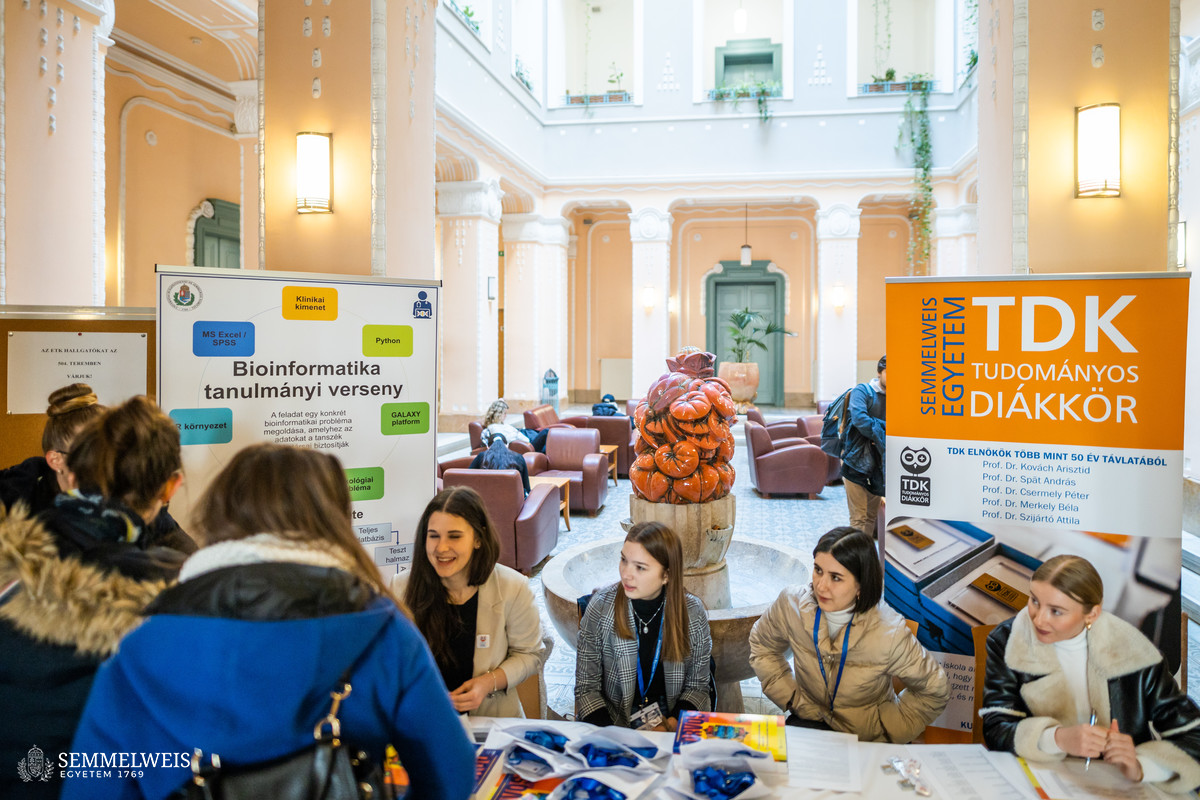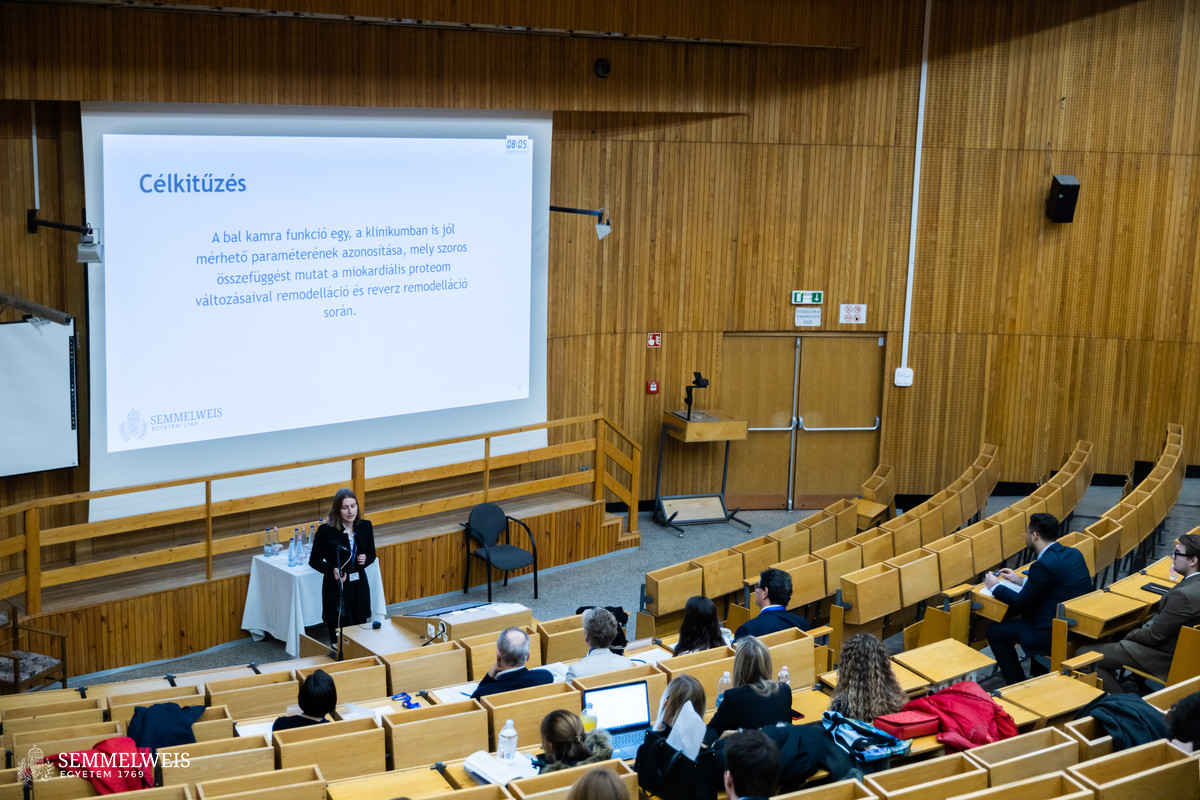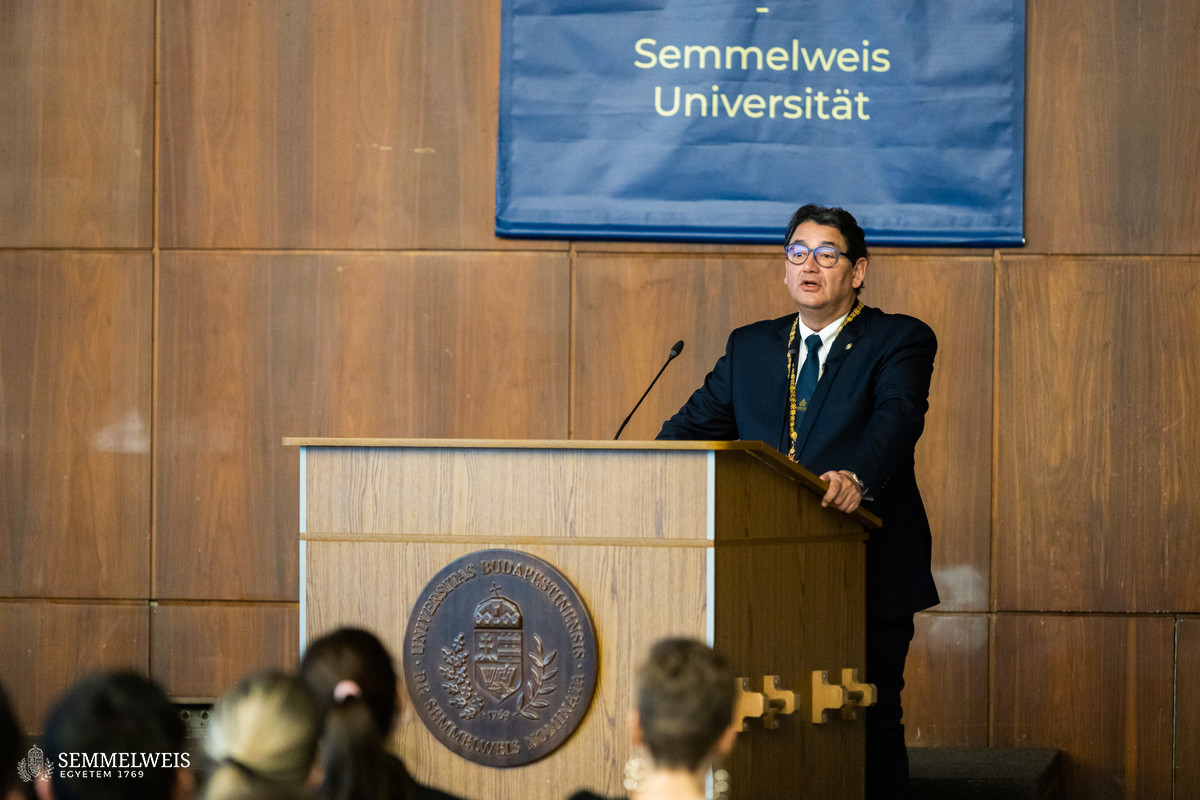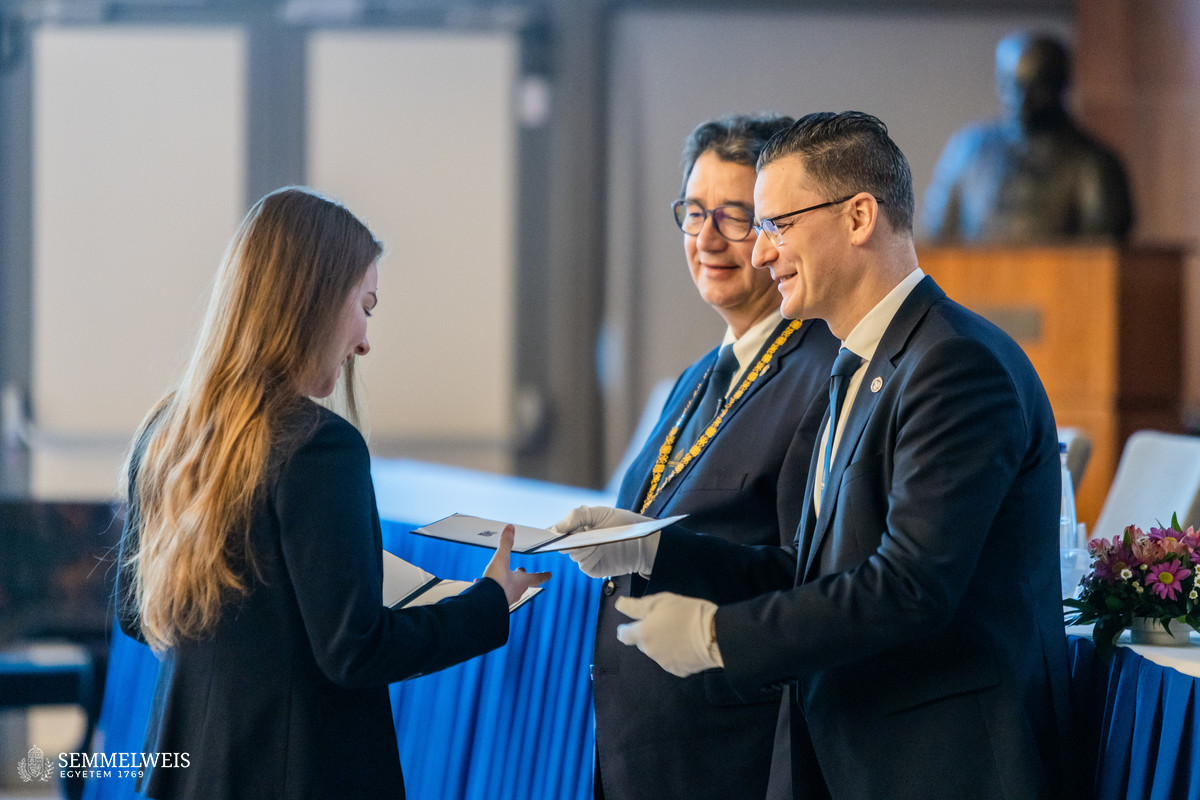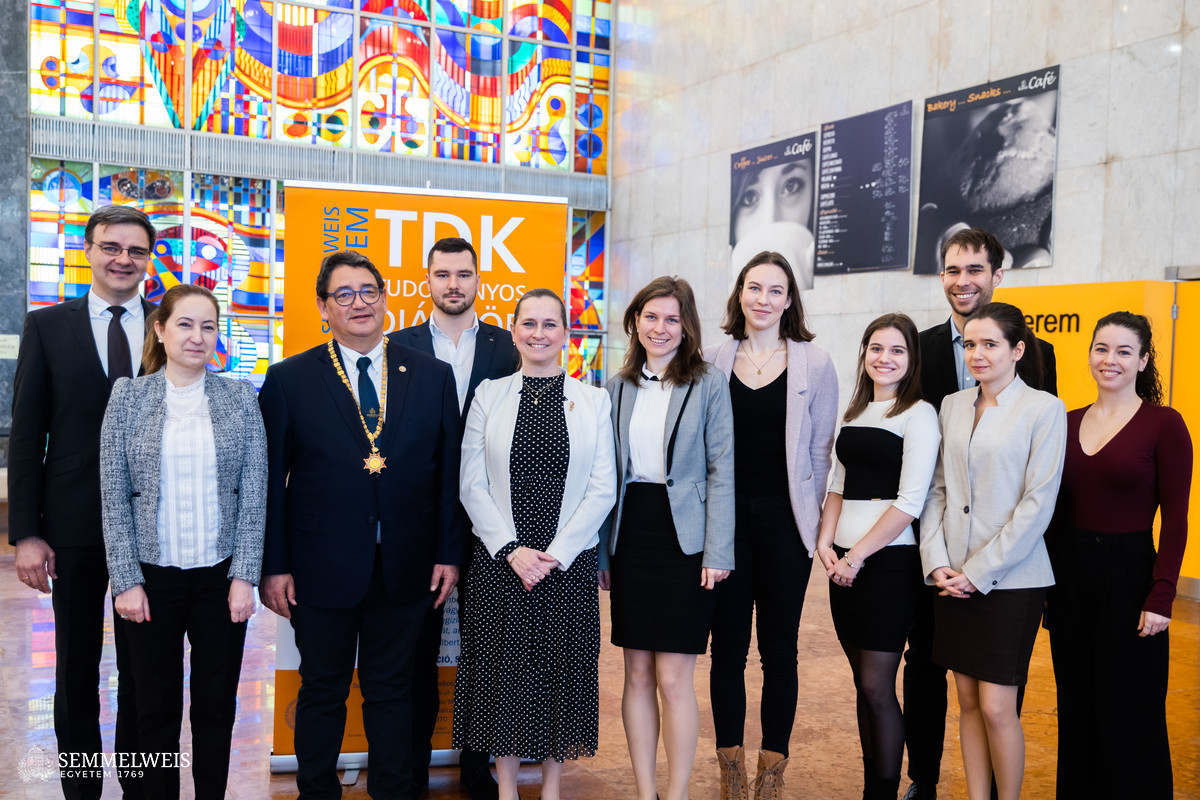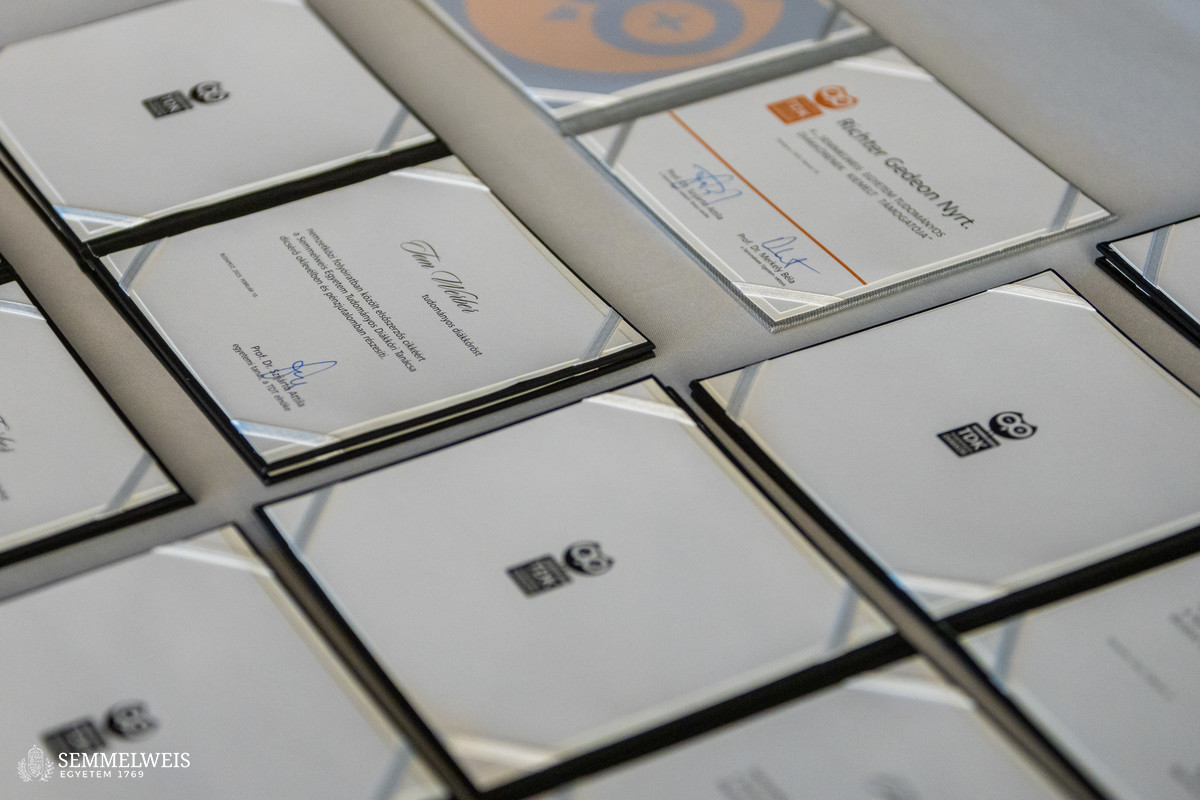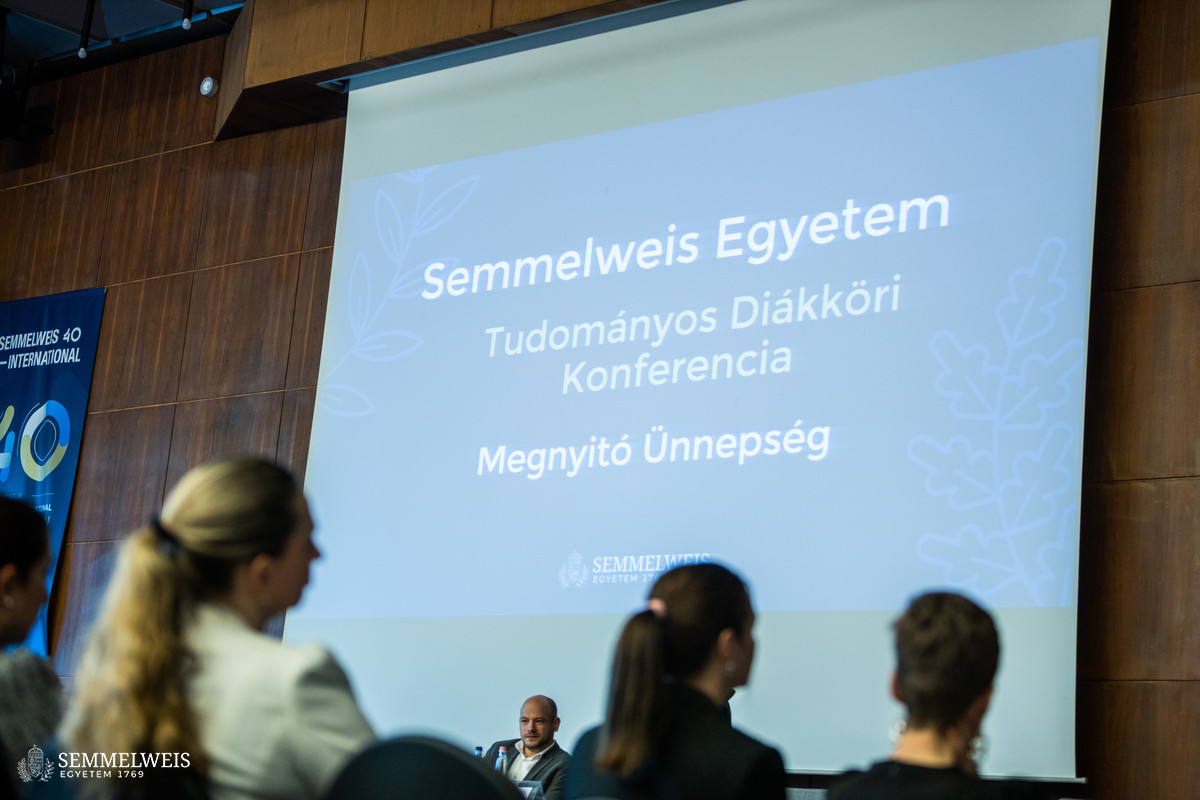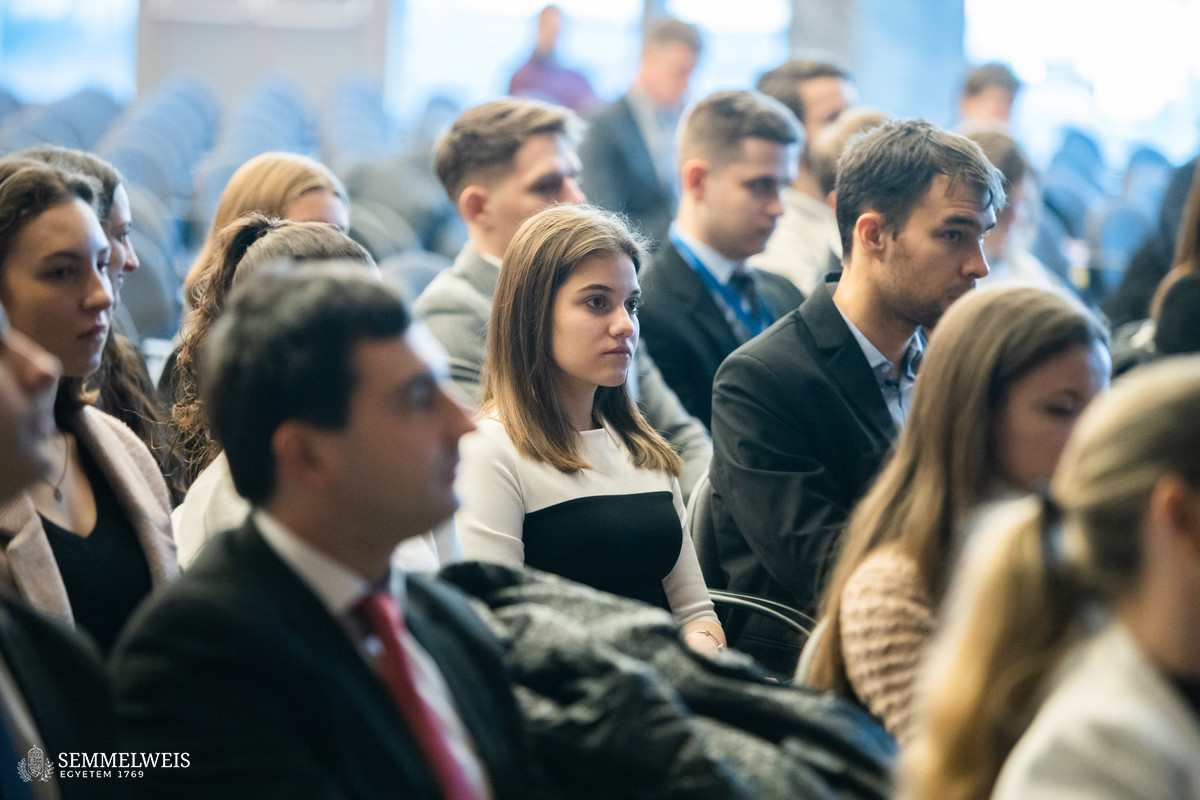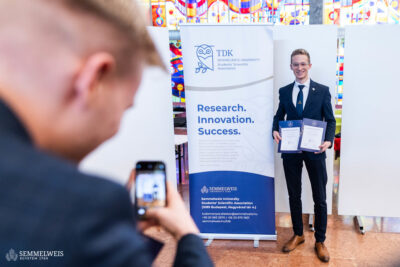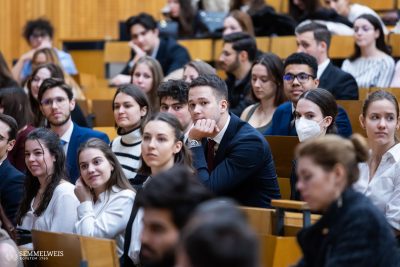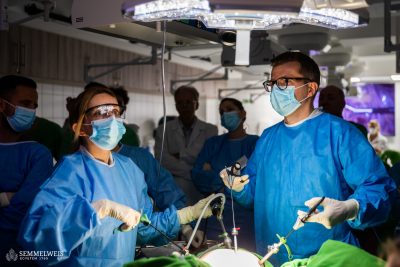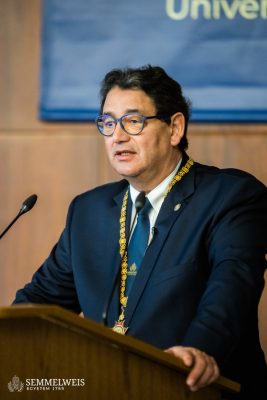 Dr. Béla Merkely, Rector of Semmelweis University quoted the words of Mihály Csíkszentmihályi at the opening of the event: “Competition gives us the opportunity to bring out the best in ourselves.” Due to the record number of presentations received, this year’s TDK was a two-day, two-site event.
Dr. Béla Merkely, Rector of Semmelweis University quoted the words of Mihály Csíkszentmihályi at the opening of the event: “Competition gives us the opportunity to bring out the best in ourselves.” Due to the record number of presentations received, this year’s TDK was a two-day, two-site event.
The rector pointed out that the conference is an opportunity for all lecturers and students committed to research. He said that he still follows the event in his spirit as a former TDK student, as he still remembers the feeling of excitement when a student is preparing for his presentation.
“Without my TDK basis, without my mentors, I could not have achieved where I am in cardiac medicine. But you can be even better than us, than your mentors”, he stressed, adding that Semmelweis University has achieved 236th place in the THE ranking and has become the best university in Central and Eastern Europe, so now the best among the best can also compare their skills at TDK. The rector emphasized that the biggest driving force for competition is not success or being better than others: it is beating ourselves.
The real competition is with ourselves. To know more, to know better. To do more, to do better than before – this is what drives the doctor, the health professional, the researcher – to strive for excellence. And this is what drives our TDK students, too”,
Dr. Béla Merkely said, congratulating the students who carried out independent research and the award-winning lecturers, too.
“This year, more than ever before, students submitted 424 presentations for the conference, which is just one hundred more than the number announced five years ago,” Dr. Attila Szijártó, President of the Students’ Scientific Association said, adding that this is the result of the increase in student activity and the exemplary talent management. He emphasized that TDK activity is not just a “lonely” research in the laboratory or at the bedside, but is also increasingly a community-forming force at the university – the growing number of participating students proves that. Last year 396 people registered for the conference, compared with around 340 applications the year before.
This is the second time that all six faculties of Semmelweis University are participating in the event – but with so many lectures, that the building of the Theoretical Block (NET) on Nagyvárad Square was not big enough, thus many lectures were held in the Vas Street building of the Faculty of Health Sciences (ETK). The president also expressed his pleasure that after the past years, the conference had been organized live again. He also reported that the 12th International TDK, which was held in parallel, had attracted international students of nearly 10 universities, who had submitted a total of almost 100 presentations. He also drew attention to the fact that Semmelweis University will host the 36th National Scientific Student Conference on Medicine and Health Sciences from 18-21 April.
At the opening ceremony, in line with tradition, the Semmelweis University Outstanding TDK Teacher Awards, the Semmelweis University Outstanding TDK Student Awards and first-author publication awards were presented.
The award ceremony for the rector’s competition will be held at a later date, but at the opening ceremony the list of the winners and their mentors was presented, which can be found here. In addition, the title of “Outstanding Supporter of Semmelweis University’s TDK” was presented to the representative of Richter Gedeon Plc.
Following the award ceremony, Dr. Orsolya Kiss, Associate Professor at Semmelweis University Heart and Vascular Center and newly awarded Outstanding TDK Teacher, held her lecture on the exercise stress testing of athletes. “These tests can not only contribute to improving the performance and competitive results of athletes, but can also be life-saving,” she pointed out, after doing the testing of elite athletes at the Heart and Vascular Center for 15 years.
Although athletes are basically healthy, their cardiovascular system is constantly under increased stress, to which the tissues of the heart adapt – for example, the heart cavities and myocardium increase in mass, which in turn leads to functional changes even at rest and specific abnormalities on ECG. As they may also suffer from myocarditis or acute myocardial infarction, these conditions can have serious consequences, including sudden death. On the other hand, very high intensity exercise can also cause right ventricular dysfunction.
Blood sampling is a good tool to assess the condition – as an example, Dr. Orsolya Kiss presented the laboratory results of a sample taken one hour after a marathon run. From these results, the temporary involvement of the myocardium can be detected by analysing the amount of cardiac necroenzymes. In addition to muscle mass measurements, the clinic mainly uses bioimpedance-based measurements, in addition to exercise and during training. The latter was used, for example, to screen for supraventricular arrhythmia during training in a symptom-free twenty-year-old football player, which was treated by a catheter ablation procedure.
“The best picture of the current fitness status is given by spiroergometric tests, which can nowadays also be supplemented by muscle oxygen saturation tests,” she said. The former can also be useful in pathological cases: as an example, she mentioned a 25-year-old national team wrestler who suffered a myocardial infarction during a training camp, but escaped with minimal myocardial damage due to prompt treatment. Tests showed that he had perfect cardiac function and was able to return to exercise gradually. “The athlete is now completely free of complaints and last year he won a world championship silver medal,” Dr. Orsolya Kiss added.
“It was a very successful conference: during one and a half days, 412 of the 424 presentations were held in 54 sessions. In the end, 94 first prizes, 71 second prizes and 54 third prizes were awarded to the best students,”
Dr. Attila Szijártó summarized at the end of the conference. He also reminded that the university sends nearly 180 presentations to the Medical and Health Sciences section of the National Student Conference: about 90 of them are presented by last year’s and 90 by this year’s first prize winners.
“One of the best things about this year’s conference is that all 54 session chairs reported that the presentations were amazingly good: several times there was only a half-point difference between first and second place,” he pointed out. He also thanked the event’s organizing committee, the students assigned to the Doctoral Council, the Semmelweis Students’ Union (HÖK) and the volunteers who helped to organize the conference.
Following the lecture series, a total of around 200 awards were presented at the event, in addition to the six prizes of the Faculty of Health Sciences. The list of the students who received the awards is available here. The special prize of the Doctoral Students’ Association was awarded to Gábor Orbán, a final-year student, after he achieved the first place in the TDK for the fourth time, and also has an OTDK (the national round) result.
Winners of Semmelweis University Outstanding TDK Teacher Award are
- Dr. Mahmoud Al-Khrasani, Associate Professor at the Department of Pharmacology and Pharmacotherapy
- Dr. Edit Dósa, Associate Professor, Heart and Vascular Center
Dr. Orsolya Kiss, Associate Professor, Heart and Vascular Center - Dr. Zsuzsanna Szilárd, Professor at the Institute of Human Sciences,
- Dr. Gergő Tóth, Assistant Professor at the Department of Pharmaceutical Chemistry,
- Dr. Ádám Domonkos Tárnoki and Dr. Dávid László Tárnoki, Associate Professors at the Medical Imaging Centre, shared prize for their work in talent management.
Winners of Outstanding TDK Student Award are
- Dr. Amirreza Alijanpourotaghsara
Thesis Supervisors: Dr. Ádám Domonkos Tárnoki, Tárnoki Dávid László, Associate Professors at Medical Imaging Centre - Dr. Dalida Borbála Berente
Thesis Supervisors: Dr. András Attila Horváth, Prof. Dr. Anita Kamondi, National Institute of Mental Health, Neurology and Neurosurgery - Zoltánné Horváth
Thesis Supervisor: Dr. Zoltán Balogh Semmelweis University Faculty of Health Sciences, Department of Nursing, Associate Professor, Vice-Dean for Clinical Relations - Dr. Zsuzsanna Ladányi
Thesis supervisors: Dr. Balázs Enyedi, Associate Professor, Department of Physiology at Semmelweis University, Dr. Attila Kovács, adjunct professor and Dr. Bálint Károly Lakatos, Assistant Professor at Heart and Vascular Center, Semmelweis University - Dr. Márton Kalabay
Thesis supervisor: Prof. Dr. László Kőhidai, Department of Genetics, Cell- and Immunobiology at Semmelweis University - Lili Kotmayer
Thesis supervisors: Prof. Dr. Csaba Bödör and Dr. Donát Alpár, Department of Pathology and Experimental Cancer Research at Semmelweis University - Dr. Ábel Major
Thesis supervisor: Dr. Gábor Nyiri, Senior Researcher at Department of Experimental Medicine - Dr. Dávid Nagy
Thesis supervisors: Prof. Dr. Tamás Radovits, Dr. Mihály Ruppert, Heart and Vascular Center of Semmelweis University - Dr. Klára Schulc
Thesis supervisors: Prof. Dr. Péter Csermely; Dr. Dániel Veres, Department of Molecular Biology, Semmelweis University - Dr. Lili Száraz
- Thesis supervisors: Dr. Pál Maurovich-Horvat, University Professor; Dr. Tamás Györke, Associate Professor; Dr. Judit Simon, radiology resident; Dr. Sándor Czibor, Assistant Professor at Semmelweis University, Medical Imaging Centre
- Dr. Adrienn Zsófia Szász
Thesis supervisors: Prof. Dr. László Kőhidai, Dr. Eszter Lajkó Senior Research Fellow, Dr. Angéla Takács Research Associate at Department of Genetics, Cell and Immunobiology - Dr. Fanni Veress
Thesis supervisors: Dr. Bálint Molnár, Associate Professor, Department of Periodontology, Dr. Réka Fazekas, Adjunct Professor, Department of Restorative Dentistry and Endodontics
Winners of the 2022 first-author publication award are
- Dalida Borbála Berente
TDK student of Dr. Attila Horváth András Horváth and Prof. Dr. Anita Kamondi (National Institute of Mental Health, Neurology and Neurosurgery) - Máté Dobó
TDK student of Dr. Gergő Tóth, Assistant Professor (Department of Pharmaceutical Chemistry) - Dorottya Fésü
TDK student of Prof. Dr. Veronika Müller University Professor (Department of Pulmonology) - Márk Kerestély
TDK student of Prof. Dr. Péter Csermely (Department of Molecular Biology ) - Gábor Orbán
TDK student of Dr. Nándor Szegedi clinical speacialist (Heart and Vascular Center at Városmajor - Tom Werber
TDK student of Dr. András Horváth (Department of Anatony, Histology and Embryology)
Melinda Katalin Kiss
Translation: Rita Kónya
Photos: Bálint Barta – Semmelweis University
